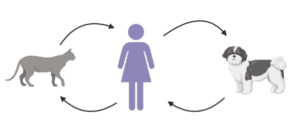

On April 5, 2020, a tiger named Nadia at the Bronx Zoo was confirmed to be infected with SARS-CoV-2 after displaying symptoms of COVID-19. Nadia is presumed to have been infected by a zookeeper, along with several other lions and tigers who were also showing symptoms. This incident raises the question of whether other animals like pet cats or dogs can become infected with SARS-CoV-2.
There are at least two documented cases of suspected SARS-CoV-2 transmission from dog owners to their dogs. On February 28, the Hong Kong Agriculture, Fisheries, and Conservation Department (AFCD) released a statement announcing that the 17-year-old Pomeranian dog of a COVID-19 patient had tested positive for SARS-CoV-2. On March 19, the AFCD released a second statement, reporting SARS-CoV-2 infection of a 2-year-old German Shepherd, whose owner was also sick with COVID-19. Both dogs were diagnosed using a polymerase chain reaction (PCR) assay, a test that involves the detection and amplification of viral RNA using a set of primers that target a region of a viral gene. However, this test does not guarantee the presence of infectious virus particles, usually detected by plaque assay. Plaque assay analysis of samples from both dogs revealed that neither dog harbored infectious virus. Furthermore, neither dog ever developed clinical signs of infection, and serological tests showed that neither dog developed antibodies to the virus. Collectively, these data suggest that even though the dogs were infected with SARS-CoV-2, they were not suitable hosts for virus replication, and thus, they were unable transmit the virus to other animals or humans.
Consistent with these observations, a recent study out of China found that SARS-CoV-2 replicates poorly in dogs; and that pigs, chickens and ducks are not susceptible to infection at all. In contrast, PCR and plaque assays revealed that the virus replicates efficiently in ferrets and domestic cats, an observation that is in agreement with results obtained with SARS-CoV, the virus responsible for the 2002 outbreak. The authors found that SARS-CoV-2 replicates in the upper respiratory tract of ferrets for up to eight days, without causing severe disease or death. The study also revealed that virus is transmitted efficiently between cats when infected cats are housed in cages adjacent to uninfected cats. In addition, both cats and ferrets produced antibodies against SARS-CoV-2, confirming development of immune responses in these animals.
Another study out of China focused specifically on the ability of cats to develop antibodies to SARS-CoV-2. The authors of this work found that 15 out of 102 tested cats from animal shelters and pet hospitals in Wuhan were positive for SARS-CoV-2-specific antibodies and that 11 of those cats produced “neutralizing,” or virus-inactivating antibodies.
What does this mean for our pets? Based on the minimal evidence so far, companion animals are at low risk of becoming infected with SARS-CoV-2, and they develop few clinical symptoms, if any. However, even a limited ability to replicate virus implicates animals as potential virus “reservoirs.” Within the context of infectious disease, a reservoir is a species or population of animals in which the virus can replicate without causing much disease, allowing for its continued existence and potential to spill over into humans. Although there is currently no evidence that cats, dogs, or ferrets can transmit SARS-CoV-2 to humans, the possibility does exist.
Some experts have proposed that cats should be routinely monitored for SARS-CoV-2 infection. However, considering how difficult it has been to implement such surveillance programs in humans so far, this might not be immediately feasible. In the meantime, it is a good idea to restrict contact with your pets and to avoid kissing them if you become infected with SARS-CoV-2. But whatever you do, please don’t abandon your pets!

Pingback: SARS-CoV-2 and your pet – Virology Hub
Just as well ‘the kind that make you sick’ don’t spread by viral videos! 😉